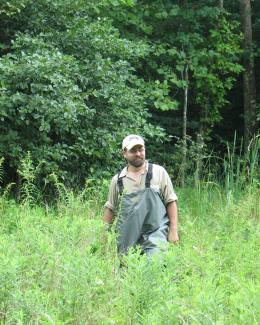Abstract
Earth system models have predicted that there will be more frequent and severe precipitation and drought events in terrestrial ecosystems. Microbially mediated decomposition of soil organic carbon (SOC) tends to increase as soils wet and decrease as soils dry. However, the long-term SOC change under intensified moisture extremes remains poorly known as it depends on the frequency and intensity of soil drying and wetting. In this study, we explored long-term SOC dynamics under scenarios of alternating drying-wetting cycles using the Microbial-ENzyme Decomposition model, a mechanistic microbial model. The model was parameterized with 11 years of observations from a temperate deciduous broadleaf forest site, showing satisfactory model performance in both model calibration (R2 = 0.67) and validation (R2 = 0.69) against heterotrophic respiration. We then used the model to simulate the long-term SOC dynamics under five scenarios of alternating drying-wetting cycles with different frequencies and severities over a period of 100 years. Results showed that the changes in active microbial biomass C and the corresponding turnover rates of SOC pools were more sensitive to soil drying than soil wetting. As a result, the cumulative soil carbon emission from microbial respiration decreased by 433.7 g C m−2 after the 100-year simulation in the highest frequency and intensity moisture scenario, but was not significantly affected by the lowest frequency and intensity scenario. This study emphasizes the nonlinear response of SOC decomposition to soil moisture changes, which causes decreased decomposition by microbes under drying that is, not compensated by increased decomposition under wetting conditions.




